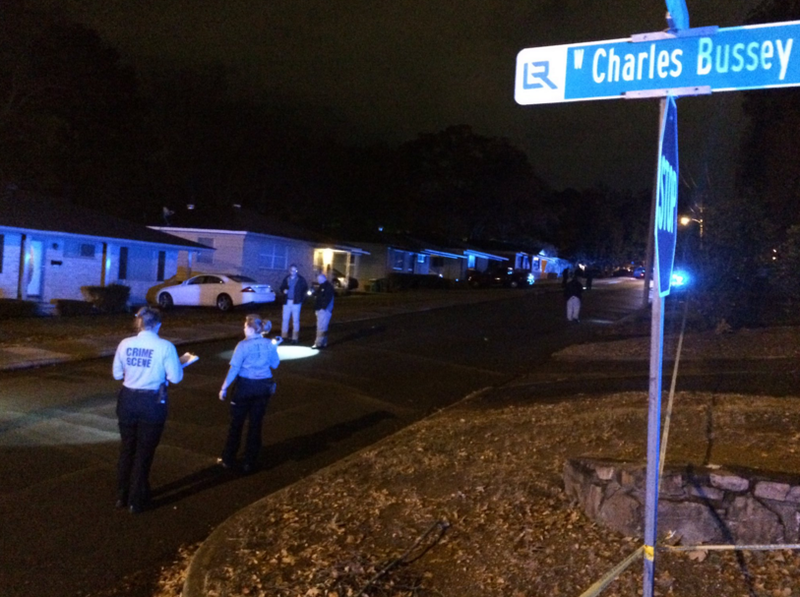The shooting death of a 2-year-old toddler in Little Rock in November intensified a long-running feud between two rival groups, contributing to an increase in violent crime in the west-central part of the city, according to a city memo.
The memo, sent from City Manager Bruce Moore to elected city leaders, also reported that a third of the 48 shootings in Little Rock through April 12 of this year involved a victim who was participating in a gang, a drug deal or other criminal activity.
As of Monday afternoon, Little Rock had seen 17 homicides this year. According to the memo, five of those killings were related to gangs or drugs.
"It's like we're under siege," said City Director Doris Wright, who requested the information at a board meeting last month. "That's why I say it is a crisis."
[HOMICIDE MAP: Interactive map shows killings so far this year in Little Rock, North Little Rock]
Violent crime in Little Rock is on the rise this year.
There has been a 16 percent increase in violent crime from Jan. 1 to April 17 compared with the same time period last year, according to preliminary data from the Police Department.
Two-year-old Ramiya Reed was shot in November while riding in the back seat of a vehicle with her mother, police said. The toddler was taken to the UAMS Medical Center and was later pronounced dead.
Ramiya was related to members of one of the rival groups, according to the memo, and her death intensified the "long-running" feud between the two groups.
The city memo also pointed to a September shooting as a factor contributing to the uptick in violence in Ward 6.
Lt. Steve McClanahan, a police spokesman, declined to identify the September shooting referred to in the memo, and he did not comment on how the shooting increased violence.
No arrests have been made in Ramiya's death, and her case is still open, he said.
"Right now we're still not making any progress," he said. "We have no new information. Nobody has come forward with anything that can put us over that hump to close the case."
Reward money for information leading to an arrest in the case is at $40,000, he said. Police do not believe Ramiya was targeted in the shooting.
Little Rock logged 15 homicides in the first three months of the year -- the highest number of killings the city has seen between January and March in at least a decade, according to department data.
Police Chief Kenton Buckner has said in the past that a violent-crime trend that began toward the end of last year has continued into 2017.
Gun violence in some U.S. cities, such as New Orleans, Philadelphia and Chicago, has attracted headlines in recent years. In particular, shooting and homicide rates in Chicago have garnered national attention.
Wright, who represents Ward 6 in west-central Little Rock, said she requested the memo after three shootings in about a 24-hour period on Colonel Glenn Road left one person dead and two others injured.
In the memo, Moore said police reported a lot of traffic on Colonel Glenn Road, something described as "more of an aggravating circumstance than a point of causation" in the increase in Ward 6 violence.
"This is a concern as it puts a lot of people, including rival groups, in a confined area searching for one another," according to the memo.
Instances of people randomly firing shots in the community also have residents on edge, Wright said. She said some residents have told her they no longer sleep in their beds because of the fear of flying bullets.
"My mother always said, 'A stray bullet has no name on it,'" Wright said.
Wright, who said the perception that Little Rock is a violent city is misplaced, said residents in her ward have a right to a decent standard of living.
After-school programs and other structured activities are ways to address crime, Wright said.
While they might not solve the current feud, she said, after-school programs provide a positive direction for youths and offer an outlet for their passions.
"That's why I fought so hard for the community center," she said, referring to the West Central Community Center near John Barrow and Colonel Glenn roads.
Dana Dossett, director of the Community Programs Department for the city, said Little Rock's Youth Intervention Program is available to teenagers who live in a high-crime area, have experienced crime inside the home or have committed crimes themselves.
According to the city's website, the program is "designed to target youth involved in gangs or at the greatest risk of being involved or recruited by gangs."
She said the program aims to expose the teenagers to different opportunities.
Dossett also said the Youth Master Plan, a strategy that began earlier this year, will collect data on programs in the department, which will then be used to update the city's programs.
A Section on 04/25/2017

